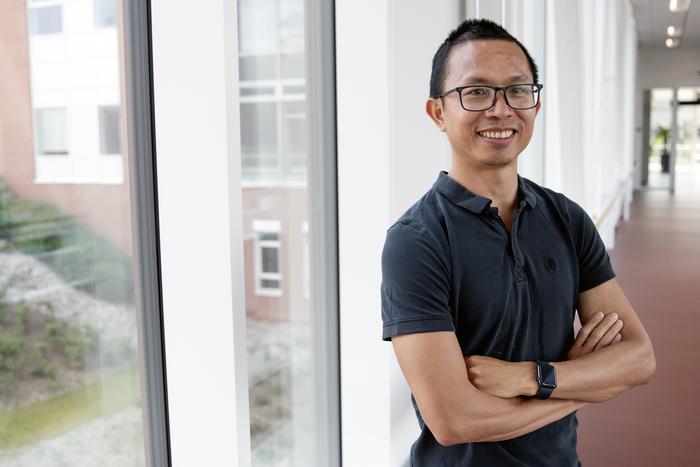Artificial Intelligence may be the key to more precise and effective gene therapy treatments. A new study from Aarhus University has found, that applying AI predictions of protein structures enhances the DNA scissor technology CRISPR, by making the cuts in a patient’s DNA more precise. This discovery might lead to more efficient treatments.

Credit: Line Rønn, Health Aarhus University
Artificial Intelligence may be the key to more precise and effective gene therapy treatments. A new study from Aarhus University has found, that applying AI predictions of protein structures enhances the DNA scissor technology CRISPR, by making the cuts in a patient’s DNA more precise. This discovery might lead to more efficient treatments.
When something goes wrong within our DNA it may lead to genetic disorders or the development of diseases such as cancer, muscular dystrophy and Huntington’s disease. But the invention of gene editing technology such as CRISPR-Cas9, which acts like a pair of molecular scissors and is used cut out specific piece of DNA in our genome, has proven to be a potential game changer in the treatment and prevention of these diseases. And now scientists from Aarhus University may have found a way to sharpen the DNA-scissor by using artificial intelligence (AI). A smaller and more precise scissor might lead to better treatments for patients with genetic disorders, explains the study’s lead scientist, Professor Yonglun Luo from the Department of Biomedicine, at Aarhus University:
“CRISPR is a fantastic technology, but what we see is that sometimes there are small imperfections in the cuts, leading to small and unwanted changes in the DNA sequence. By developing a smaller and more precise tool called base editing, scientists are getting closer to being able to correct genetic mistakes that cause diseases and potentially develop better treatment options and maybe even cures for various genetic disorders down the line.”
AI led to the discovery of a more precise gene editing tool
Proteins execute their functions in a three-dimension (3D) structure. The Aarhus based scientists used artificial intelligence (AI), in this case so-called AlphaFold2, to predict 3D protein structure and discover hundreds of deaminase-like proteins, which are a group of enzymes capable of modifying the building blocks, known as nucleotides, in the DNA.
Often deaminase-like proteins are used in a more precise form of gene editing technique known as base editing, which is what the researchers specifically focused on in the project, says Professor Yonglun Luo.
“Simplified, base editing can be explained as a way to fix spelling mistakes in our genetic code. Our DNA is made up of four building blocks called nucleotides, and sometimes there can be a single incorrect nucleotide that causes a genetic disease. Base editing aims to correct these specific mistakes by changing the wrong nucleotide to the correct one.”
By finding and engineering a smaller version of the deaminase-protein, scientists now have a more precise and powerful gene editing tool.
“This represents a breakthrough in the field of protein engineering and opens up new possibilities for designing and manipulating proteins for various applications,” says Professor Yonglun Luo.
Could also lead to stronger crops
The breakthrough in protein engineering may also benefit the farmers in addressing the challenges they face. Crops can be vulnerable to diseases, pests and other environmental conditions, and farmers are continuously trying to find ways to protect them from some of these factors. And the new discovery could also have a significant impact on the agricultural sector explains Professor Yonglun Luo:
“In the study we also achieved efficient base editing in soybeans for the first time. This opens up possibilities for genetic modification and crop improvement in soybean plants, which, if successful, could have a big impact on the agricultural sector by making the plants more resilient and stronger.”
And there might be more to discover, says Professor Yonglun Luo.
“Our AI-based protein structure prediction approach can be extended to discover and engineer other proteins for precise genome editing. By applying this strategy to different protein families or specific targets, researchers can uncover new properties and functionalities that can be utilized in diverse fields, such as medicine, agriculture, and biotechnology.
Professor Yunglun Luo and his team now hopes to continue the research with follow-up studies focused on evaluating the performance of their discovery in different disease models and human cells. The hope is to determine its potential for correcting disease-causing mutations and advancing precision medicine.
The research results – more information
- Studytype: Basic Research
- Partners: Professor Caixiao Gao, State Key Laboratory of Plant Cell and Chromosome Engineering, Center for Genome Editing, Institute of Genetics and Developmental Biology, Innovation Academy for Seed Design, Chinese Academy of Sciences, Beijing, China
- Read more in the scientific article
Contact
Professor Yonglun Luo
Aarhus University, Department of Biomedicine
Mail: [email protected]
Phone: +4522411944
Journal
Cell
Method of Research
Experimental study
Article Title
Discovery of deaminase functions by structure-based protein clustering
Article Publication Date
27-Jun-2023




